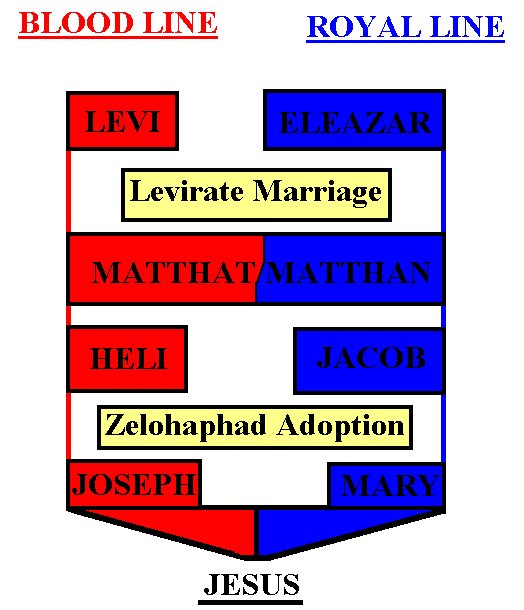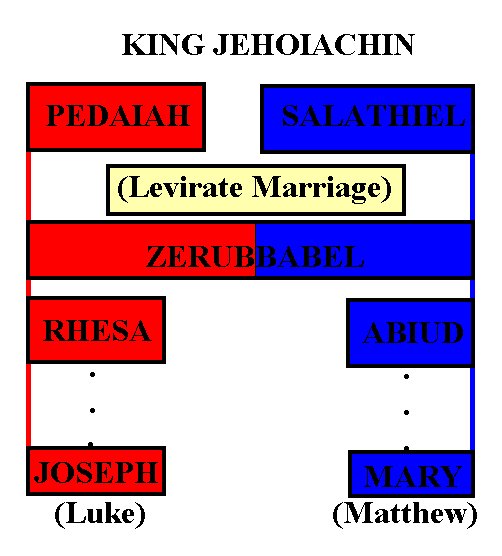III. Appendix III
Genealogy and Ancestry of Jesus Christ
(Summarized)
" ... What think ye of Christ? whose son is he? ... " ~
Matthew 22:42
This question may will be asked of all men. What does one think of Christ?
Whose son is he? We have been looking into that very question. And thus
it seems important, that while the topic of the entire text is that of the
descent of Jesus Christ from King David as well as Joseph of Egypt, that in
one place, the whole of the genealogy and ancestry of Jesus Christ be set
forth. Thus is the purpose of this appendix, which will concern itself with
three particular ancestral lines in Jesus being the Son of God, in Jesus
being the Son of David and in Jesus being the Son of Joseph.
Son of God
~ Heir of God the Father ~
" ... Thou art the Christ, the Son of the living God." ~
Matthew 16:16
When Jesus Christ asked his diciples the similar question as in (Matthew
22:42) as to whose son was he, it was Peter who did answer most appropriately
as the spirit of revelation from the Father had revealed it unto him. Jesus
is the Christ! He is the Son of the living God!
Jesus' ancestral linage is one which directly links him to heaven. He is the
literal and immediate Son of God the Father, the Only Begotten Son of God the
Father in the flesh of all the children of God pertaining to the generation
of Jesus Christ from the beginning.
In respect to this parenthood, one ought to set forth a few particulars.
First Mary was a virgin before the conception of Jesus in her womb and Mary
was still a virgin after the conception of Jesus in her womb. The birth of
Jesus was a 'virgin birth'. Mary had never known man. If science today can
artificially inseminate a woman with the level of skill and knowledge that
they have, certainly God the Father can perform such and likely far less
crudely thay that of the course of men by and in the power of the
overshadowing of the Holy Ghost.
As miraculous as it may seem to some, Mary was with child, the child was that
which was 'genetically' of God the Father. And yet she was a virgin. Thus is
the power of God. And for whatever purpose of perhaps bring Mary into the
presence of God for such to have taken place, the Holy Ghost was bestowed
upon her that she might endure that presence, as she was carried away in the
spirit for a space of time for the heavenly process of the conception to
take place.
So thus so endowed as the Son of God, Jesus Christ possesed the power over
death and the grave. Yet as son of Mary, he also had the capacity of death.
Yet no man could that the life from him, he would freely give it. And though
he had power over the forces of man, he would condescend to be so inflicted
by the hand of men until there had been sufficent cause placed upon him unto
his death.
In short when Jesus was mocked upon the cross, that if he were the Son of
God, he could have come down off the cross and saved himself, the irony in
that is that he could have. He had that power to do so. Yet he suffered it to
be as it was, for it was the cause for which he came into the world to so
suffer death for the sins of man, that man might be redeemed, saved and
live again through the atonement and resurrection of Jesus Christ.
Son of David
~ Heir of the Royal House of Israel ~
Now there are a number of considerations to consider in the genealogy of
Jesus Christ in respect to him being the Son of David. And the least of these
is not the fact that David will also be shown to be the son of Jospeh of
Egypt. But that ancestry will be left for that section which deals with Jesus
being the Son of Joseph and Epharim which will follow later.
But for now the primary question seems to be how to reconcile the two
genealogies of Jesus as given in the New Testament, in the Gospel of Matthew
and the Gospel of Luke. The first point of reconciliation is taken from
Elder James E. Talmage's "Jesus the Christ", page 81,
wherein he states that Joseph and Mary were cousins and that Jacob and Heli
were brothers. This would make the genealogy of Joseph and Mary practically
the same. And it would mean that he who Matthew calls 'Matthan'
(Matthew 1:15) is one and the same person with he who Luke calls
'Matthat' (Luke 3:24). And while Luke makes Levi the father of
Matthat, Matthew makes Eleazar the parent of Matthan. This condition
occurs in Jewish families when a 'brother' (cousin or kinsman) raises up
seed to his deceased kinsman by the practice of 'Levirate
Marriage' (Deuteronomy 25:5-10 & Ruth 4:5 & 10).
And thus agreeing with Elder Talmage, the next question is to attempt to
ascertain who of Jacob and Heli were the particular fathers of Joseph and
Mary. In this consideration, one might well
consider that while any surviving son may well show his 'bloodline lineage'
back to father after father even until Adam; the vast majority of any one
particular line of descent, particularly within Royal linages, will always
have a number of heirship brakes in that eventually the inheriting senior
line will become extinct and the heirship fall to another. And likely in the
history of Israel it will be to the heir of a 'Levirate Marriage'. Thus the
cases of the 'Levirate Marriages' will be presumed to be on the part of the
'Royal Ancestry' which is Matthew's genealogy, for Matthew is the one who
does set before the eyes of the Jews Jesus' right to the lineage of the
Royal House of David. And the direct line lineage from bloodline father to
son will be presumed to be that of Luke's genealogy, which is not
particularly as concerned with setting out the Royal House of David before
the Gentiles as he is in setting out the right of 'covenant' inheritance
through Jesus' lineage not only back through David, but to Abraham and even
Adam. Therefore, this would make Jacob the actual father of Mary and Heli the
actual parent of Joseph.
 Having presumed Mary to be the daughter of Jacob would make her a
princess in Israel, a daughter of the Royal line, and apparently the heir
in female form. It would also imply that Jacob had no sons and thus the
right to the throne would either be lost or pass to a grandson, who would be
Jesus Christ. And while Joseph's marriage to Mary would make him to be
considered Jacob's son, the rightful heir to the throne would be the first
born son of Mary. Now this would be a case of a 'Zelohaphad
Adoption' (Numbers 36:8-9). That is, every daughter in Israel who
has no brother to inherit, stands heir to the family inheritance, which the
right of the Royal Lineage would be, must seek to marry someone within her
father's tribal family clan, so that no such rights of inheritance may pass
from that tribal family to another family or tribe.
Having presumed Mary to be the daughter of Jacob would make her a
princess in Israel, a daughter of the Royal line, and apparently the heir
in female form. It would also imply that Jacob had no sons and thus the
right to the throne would either be lost or pass to a grandson, who would be
Jesus Christ. And while Joseph's marriage to Mary would make him to be
considered Jacob's son, the rightful heir to the throne would be the first
born son of Mary. Now this would be a case of a 'Zelohaphad
Adoption' (Numbers 36:8-9). That is, every daughter in Israel who
has no brother to inherit, stands heir to the family inheritance, which the
right of the Royal Lineage would be, must seek to marry someone within her
father's tribal family clan, so that no such rights of inheritance may pass
from that tribal family to another family or tribe.
The purpose of the 'Zelohaphad Adoption' is to the same end as the 'Levirate
Marriage', but it is accomplished in a differing manner. In a 'Levirate
Marriage' the firstborn son become the heir of the dead regardless of the
tribal affiliation of the near kinsman. But in order to obtain the same end
in a 'Zelohaphad Adoption', both the husband and the wife must be of the same
family clan in order to preserve the right of inheritance among the living
through the wife as opposed to the dead husband as in 'Levirate Marriages'.
The fact that the right was preserved in and through Mary's right becomes
quite significant, for it is in this that Jesus has a direct parental right
to the Royal House of David through his mother. That is the
'woman' Mary is his one true parent in the flesh by whom the
right of the Royal House of David did come.
Descent Back to Zorobabel
Now Zorobabel or Zerubbabel was the noted Governor or 'Pekhah' of Jerusalem,
representing the Royal House of David during the rebuilting of the temple.
He was the legal heir of King Jehoiachin, reportedly the 'son of Pedaiah'
 (1 Chronicles 3:16-19) who was a younger son of King Jehoiachin who seems to
have performed a 'Levirate Marriage' in behalf of his elder brother and heir
Sheltiel (Salathiel), who is the more 'well known' Royal
Heir through whom the ancestry was preserved. Even Luke's account names
Shethiel as the 'bloodline' ancestor instead of his younger performing
redeeming brother Pedaiah so famous was the lineage. So Shethiel is the Royal
'parent of right' by the Law of God, Pedaiah raising up seed to his deseased
brother who was most likely the true father of Zerubbabel by blood. Thus the
legal right to the throne would have again came down through a 'Levirate
Marriage', but this time by actual brothers of the same father Jehoiachin.
Zerubbabel is also known by the name of 'Sheshbazzar', which is his
Persian name (Ezra 1:8). Zerubbabel had at least the two sons whose lineage
is reported in Matthew and Luke. Abiud was the eldest and heir to the Royal
Lineage and is thus reported in the Matthew genealogy. Abiud's younger
brother, another son of Zerubbabel, was Rhesa, who was the bloodline ancestor
to Joseph, the husband of Mary.
(1 Chronicles 3:16-19) who was a younger son of King Jehoiachin who seems to
have performed a 'Levirate Marriage' in behalf of his elder brother and heir
Sheltiel (Salathiel), who is the more 'well known' Royal
Heir through whom the ancestry was preserved. Even Luke's account names
Shethiel as the 'bloodline' ancestor instead of his younger performing
redeeming brother Pedaiah so famous was the lineage. So Shethiel is the Royal
'parent of right' by the Law of God, Pedaiah raising up seed to his deseased
brother who was most likely the true father of Zerubbabel by blood. Thus the
legal right to the throne would have again came down through a 'Levirate
Marriage', but this time by actual brothers of the same father Jehoiachin.
Zerubbabel is also known by the name of 'Sheshbazzar', which is his
Persian name (Ezra 1:8). Zerubbabel had at least the two sons whose lineage
is reported in Matthew and Luke. Abiud was the eldest and heir to the Royal
Lineage and is thus reported in the Matthew genealogy. Abiud's younger
brother, another son of Zerubbabel, was Rhesa, who was the bloodline ancestor
to Joseph, the husband of Mary.
Son of Joseph and Ephraim
~ Heir of the Birthright ~